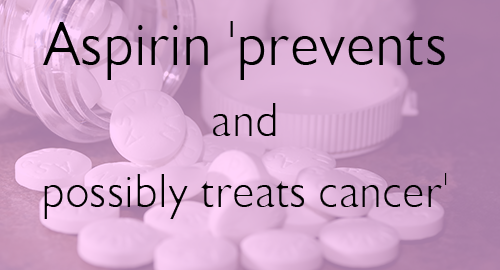- Clinic:
- 0733 945 717
- 0739 434 212

Nairobians as good Samaritans
September 15, 2017
When advanced fertility treatment fails
October 4, 2017Aspirin 'prevents and possibly treats cancer'

Taking a low dose of aspirin (“junior aspirin) every day can prevent and possibly even treat cancer, fresh evidence suggests.The three new studies published by recently add to mounting evidence of the drug's anti-cancer effects.
Taking aspirin over a long period of time can substantially cut the risk of dying from a variety of cancers, according to studies showing that the benefit is independent of dose, gender, or smoking.
It also found that the protective effect increases with age.Prof Peter Rothwell, from Oxford University, and colleagues, who carried out the latest work, had already linked aspirin with a lower risk of certain cancers, particularly bowel cancer.
But their previous work suggested people needed to take the drug for about 10 years to get any protection.Now the same experts believe the protective effect occurs much sooner - within three to five years - based on a new analysis of data from 51 trials involving more than 77,000 patients. And aspirin appears not only to reduce the risk of developing many different cancers in the first place, but may also stop cancers spread around the body.
The trials were designed to compare aspirin with no treatment for the prevention of heart disease.
A previous study by the same authors showed that low doses of aspirin (75-300 milligrams) reduced the number of cases of colorectal cancer by a quarter and deaths caused by the disease by more than a third. The latest study confirms the earlier results and concludes that similar effects can be shown for other types of cancers.
New Aspirin-Cancer FindingsThe study looked at eight trials examining the effects of a daily dose of aspirin on preventing heart attacks involving 25,570 patients, 674 of whom died from cancer. They showed a 21% reduction in the number of deaths caused by cancer among those who had taken aspirin, compared with people who had not.
The investigation also showed that the benefits of taking aspirin increased over time. After five years, death rates were shown to fall by 34% for all cancers and by 54% for gastrointestinal cancers.
Participants were also followed up after 20 years, by which point 1,634 of the original participants had died as a direct result of cancer. This 20-year follow-up established that the risk of cancer death remained 20% lower among those who had been allocated aspirin than those in the control group for all solid cancers, including lung, prostate, brain, bladder, pancreatic and kidney cancers, and by 35% for gastrointestinal cancers.
Protective Effect Increases Over TimeThe protective effect of taking low doses of aspirin varied according to the type of cancer and how long aspirin had been taken, the authors found. For instance, it only became apparent after about five years for esophageal, pancreatic, brain, and lung cancer; about 10 years for stomach and colorectal cancer; and about 15 years for prostate cancer.
Should Middle-Aged People Take Aspirin?
Previous research has linked aspirin with reductions in heart attacks and strokes, but doctors have been wary when recommending whether people should take daily doses of aspirin because of the risk of gastric bleeding. Rothwell says, "The size of the effect on cancer I think is such that it does more or less drown out those sorts of risks."
'Promising Results'
"We encourage anyone interested in taking aspirin on a regular basis to talk to their [doctor] first."
Policy & further Research
Since it has been clearly suggested aspirin might be beneficial for treating and preventing cancer, KEMRI and other research for health organizations are exploring the findings in their own research contexts.
The Health Ministries may wish to start considering how best to advise the public about the benefits and risks of aspirin.
Sidebar: Aspirin and CancerAspirin (acetylsalicylic acid) has been used for many years as a painkiller. It has an anti-inflammatory action
The fall in the risk of death broke down according to individual types of cancer:
Esophageal cancer (60%)
Colorectal cancer (40%)
Lung cancer (30%)
Prostate cancer (10%)
Low-dose (75mg) aspirin- “Junior aspirin” is already recommended for people with known cardiovascular disease to prevent stroke and heart attack
The benefits for healthy people are still unclear
Low-dose aspirin treatment is linked with a very small increase in the risk major bleeding in the stomach and brain.
Anyone considering taking aspirin is advised to talk to their doctor first

